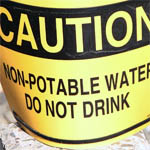
Principles of Sustainability
Chapter 7 - Sustainable Solutions for Water Resources
Part 3 - Wastewater Treatment in Developed Countries
 The water that we use in our homes and industries is one of the major waste streams of human civilization. In the United States there are over 16,000 wastewater treatment facilities. Large cities can produce over 100 million gallons of wastewater in a single day.
The water that we use in our homes and industries is one of the major waste streams of human civilization. In the United States there are over 16,000 wastewater treatment facilities. Large cities can produce over 100 million gallons of wastewater in a single day.
There are new concerns and new approaches about the water that we use and flush down our drains. Emerging classes of trace contaminants like hormonally active substances and pharmaceutical residues from human and veterinary use, are now routinely detected in untreated and treated wastewater, and there are increasing observations of these bioactive compounds in natural waters and wildlife.
New approaches to emerging contaminant removal, pathogen disinfection, and the enhanced harvesting of wastewater phosphorous for global agriculture facing a peak phosphorus supply, are on the near-term horizon.
Enhanced programs for water reuse and recycling are becoming more common in water stressed environments like the arid southwestern US. Moving beyond the loaded description of “toilet to tap,” the recycling of water in areas of limited or diminishing water resources is increasingly the only option for sustainable development.
In developed and developing countries, effective wastewater treatment is a pillar of our civilization, and a hallmark of sustainability. It is perhaps unfortunate that we have come to call this wastewater, and not something like recyclable water, or reusable water. The harvest of this fundamental water resource will no doubt become increasingly important in many areas where growth and development outstrips a plentiful water supply.
Our future water sustainability is critically linked to our sustained development of the infrastructure and advances in technology that make this water harvest possible, while sustaining environmental quality. Water conservation, reuse, and recycling is a vital part of our present and our future.
Our responsibility for sustainable water does not stop with a simple flush.
Keywords
- municipal wastewater
- industrial wastewater
- preliminary treatment
- primary treatment
- secondary treatment
- tertiary (advanced) treatment
- aerobic digestion
- anaerobic digestion
- nutrient removal
- particle settling theory
- secondary clarifier
- activated sludge process
- biofilm
- suspended growth process
- trickling filter
- biosolids management
- dewatering
- composting
- biogas
- disinfection
- chlorination
- UV disinfection
- ozone disinfection
- water reuse
- reclaimed water
- water recycling
- hormonally active substances
- pharmaceutical residues
Suggested Reading
-
Sustainability. Zhou, J.P., Erdal, Z.K., McCreanor, P.T., Montalto, F. (2010) Water Environment Research. Vol 81, Issue 10, pp. 1376-1389. DOI 10.2175/106143010X12756668801293
(Photo credit: Greg Möller)
